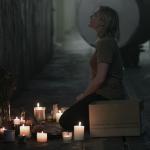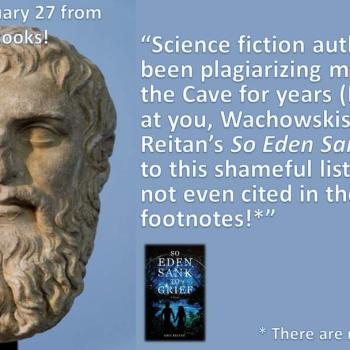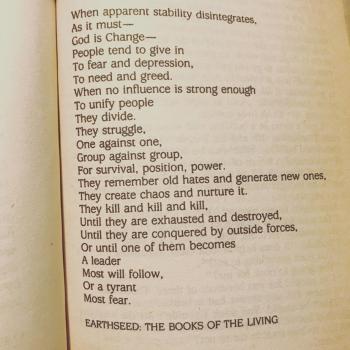For the early part of the movie Ad Astra, I felt like it was stunning visuals in search of a story. By the end, I realized that the first part of the movie and its overall feel and pacing are central to its message. It was helpful that, immediately after finishing watching it, I saw that Paul Levinson reviewed the movie as well on his blog. He describes it as the 2001 of the 21st century. I think that’s a helpful way to think about it, and its message seems to become clear precisely in the contrasts between those two visions of exploring the outer planets of our solar system in search of other intelligent life. The standard trope of science fiction is that, if we reach out or simply wait, superior beings will be encountered who will save us (or at least offer us superior technology that makes our lives more interesting). The message of Ad Astra is summed up well in a phrase that the main character speaks to his father, telling him that he hadn’t failed, he’d discovered that “we’re all we’ve got.” The father speaks of his quest in religious terms and he pursues it with religious zealotry (of a kind that the film accurately conveys that can be wedded to a secular scientific pursuit every bit as much as a purely religious one, and a combination of the two is also possible). Throughout, space travelers are forced to answer questions that evaluate their psychological wellbeing. This ties in with the film’s major themes in three major ways. One is the question of how the son copes with the loss of his father, the discovery that he is still alive, and the discovery that he was a broken and flawed individual. Another is the potential for any zealot’s quest, including that of adventuring into space or seeking scientific knowledge, to damage us and pervert and distort our values. And the last one is the recognition that dedication to a mission isn’t to be equated with psychological wellbeing, unless our central mission is to connect meaningfully with those around us, to love, value, and cherish them.
Science fiction primed us to expect the son to reach Neptune and learn that his father had discovered some new life, some important secret. Instead he discovered that we are alone in the sense of not having extraterrestrial neighbors to connect with, on a journey that made him realize he doesn’t appreciate being alone in the personal sense as much as he thought. This sums up something of the big shift in our worldview when it comes to science, one that Ad Astra encapsulates and explores admirably. We are unlikely to be visited by aliens anytime soon if ever, the secular angels of our updated mythology. Warp drive or its equivalent may never be a reality and journeys into the heavens that people have claimed to experience are psychological in charater rather than cosmological. Can we make meaningful lives – lives that include space exploration – in the absence of the things that we have tended to rely on in our meaning-making story-weaving in the distant past right through to our time? Can we not expect spiritual or physical beings of light to descend from the sky and know that we won’t rise into the air to meet them, and yet still find a vision that is universal and feeds our deep desire to connect with the transcendent? That is a crucially important question, since in the absence of a transcendent vision of the ultimate, as Paul Tillich famously pointed out, we reach for lesser idols such as nation and tribe, consistently with tragic consequences. The answer is the one John A. T. Robinson (among others) offered as a replacement of our classic metaphors of height for God, namely depth. We can connect meaningfully with others and recognize that, even if distances we can never cross separate us from other parts of the universe we are curious about, we can still be connected to them as part of the whole. As I wrote once before:
If we take seriously the depiction of God relating to the world as we do to our bodies, then assuming we consider personhood an emergent property rather than something inserted into us as a separate substance, there is no place where we can pinpoint our “self” if one removes the entirety of our bodies. The human person is a reality that emerges from the organization and interaction of the constituent parts that make us up, and is not to be found somewhere tucked in between the cells. And so, if we think of God as the highest order of emergence out of all that exists, then we can truly say, in good panentheistic fashion, that God is everywhere, and all things exist in God, and yet none of them simply is God. And when we think about the connections that come to exist between us, and emerge as something transcendent from the interaction, then we may say things such as “God is love” and really mean it.
We cannot explore ourselves as human beings, our relationships with one another, or space, without the range of symbolic language religious and poetic speech provides that has the capacity to enable us to do so without falling into reductionism. And so the moments of prayer, and the thought that “In the end, the son suffers the sins of the father,” provide the flip side to the misguided religious-scientific zealotry we see depicted. That’s perhaps the most important warning and message in the movie. It is not enough for the object of our faith to transcend us. It must also encompass us all. Otherwise it is not a genuinely ultimate concern, but an idol likely to leave death, heartache, and heartbreak in its wake.
In related news, NASA shared posts about Mars’ lost water and a new helicopter that will be used to explore the red planet.
A blog post about a recent essay in the New Yorker also seems to capture something of what I take away from the film. In it, Vance Morgan quotes the following words from Peter Schjeldahl:
God creeps in. Human minds are the universe’s only instruments for reflecting on itself. The fact of our existence suggests a cosmic approval of it . . . We may be accidents of matter and energy, but we can’t help circling back to the sense of a meaning that is unaccountable by the application of what we know…
I think we’re wired for belief, and it’s sort of human pride and ambition to overrule those intuitions. But I find it much easier just to give in. We are tiny, little specks in the universe, and there is a credible limit to what we know. And in a way, the more we know, the more shoreline of mystery there is . . . Human minds are the only ways the universe reflects on itself. And we keep circling back to that – you know, why we’re here and not here. And I’m – I guess I’m sort of relaxing into the state of soul that that generates.
See also the article in Commonweal on disenchantment, as well as this:














